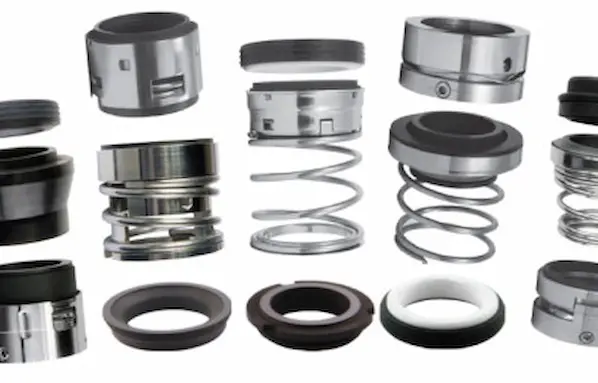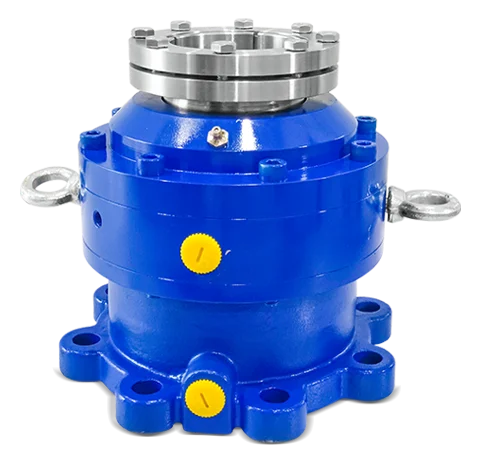Posted At: Jul 04, 2025 - 1,444 Views

A Complete Guide to Pump Seal Types and Their Uses
When it comes to efficient pump performance, seal selection plays a major role in ensuring reliability, minimizing leaks, and maintaining safety across operations. Whether you're managing chemical plants, water treatment systems, or industrial machinery, understanding pump seal types and their applications is essential.
This blog breaks down the different types of pump seals, how they work, and how to choose the right one for your pumping system.
What Is a Pump Seal?
A pump seal is a critical component that prevents fluid from leaking between the rotating pump shaft and the stationary pump casing. In industrial systems, these seals are essential for ensuring safety, reducing maintenance needs, and avoiding contamination.
Why Pump Seals Matter in Industrial Applications
Using the right mechanical seal or sealing system can help you:
Prevent fluid or gas leakage
Maintain pressure within the system
Improve energy efficiency
Reduce downtime and maintenance
Meet safety and compliance standards
Main Types of Pump Seals and Their Applications
Here’s a clear breakdown of the most widely used types of pump seals in industrial settings:
1. Mechanical Seals
Mechanical seals are modern sealing devices used in over 90% of industrial pumps. They consist of a rotating ring and a stationary ring that press together, creating a leak-tight seal.
Common Mechanical Seal Types:
Single Mechanical Seal
Used In: Water pumps, light-duty industrial processes
Advantages: Cost-effective, simple installation
Limitation: Not ideal for handling aggressive or abrasive media
Double Mechanical Seal
Used In: Chemical, oil & gas, pharmaceutical industries
Advantages: Handles hazardous and high-temperature fluids, better containment
Limitation: More expensive and complex setup
Cartridge Seal
Used In: High-performance industrial pumps
Advantages: Pre-assembled for convenience, quick to install, and reduces the risk of installation errors or seal failure.
Limitation: Higher upfront cost
Component Seal
Used In: Custom-built and older pump systems
Advantages: Customizable, lower cost
Limitation: Requires technical expertise to install
2. Gland Packing (Stuffing Box)
An old yet effective sealing method that uses braided packing material tightly compressed around the pump shaft to reduce leakage.
Used In: Agriculture, mining, marine, and slurry pumps
Advantages: Low cost, easy to service
Limitation: Requires frequent maintenance, less efficient
3. Lip Seals
Lip seals are made of rubber or elastomers and feature a flexible lip that touches the rotating shaft.
Used In: Automotive pumps, small industrial machinery
Advantages:Simple, compact, and cost-effective
Limitation: Limited to low-pressure and clean fluid applications
4. Magnetic Drive Seals
These seals remove the need for a traditional shaft seal by using a magnetic coupling to transmit torque from the motor to the impeller without direct contact.
Used In: Highly corrosive or hazardous chemical transfer systems
Advantages: No leakage, no seal wear
Limitation: More expensive and specific to non-contact designs
5. Labyrinth Seals
A non-contact sealing method that uses grooves to create a difficult path for leakage.
Used In: Compressors, turbines, and rotating equipment
Advantages:No friction or wear
Limitation:Not ideal for liquid sealing—used mostly for gases
6. Bellows Seals
These feature metallic or elastomeric bellows that act both as a spring and sealing element.
Used In: High-temperature or corrosive fluid applications
Advantages: No dynamic O-rings, excellent for axial movement
Limitation: Higher cost, needs proper shaft alignment
How to Choose the Right Pump Seal
Choosing the right seal type involves considering several key factors:
- Nature of the fluid: Is it corrosive, abrasive, or hazardous?
- Temperature and pressure: Higher demands may require double or bellows seals
- Shaft speed and size
- Ease of maintenance
- System downtime tolerance
- Compliance with safety and environmental standards
Always consider working with a seal manufacturer or pump expert to make the right selection.
👉 For a full breakdown on selecting the right seal, check out How to Choose the Best Mechanical Seal for Your Pump.
Typical Applications of Pump Seals by Industry
| Industry | Seal Type | Application |
|---|---|---|
| Water Treatment | Cartridge / Single Seal | Clean and waste water systems |
| Chemical Processing | Double Seal / Bellows | Handling toxic, corrosive chemicals |
| Oil & Gas | Bellows / Magnetic Seal | High-pressure crude and gas transfer |
| Food & Beverage | Lip Seals / Cartridge | Sanitary, low-contamination environments |
| Power Generation | Labyrinth / Double Seal | Turbines and process cooling pumps |
Benefits of Choosing the Right Pump Seal
- Longer seal and pump life
- Reduced leakage and downtime
- Energy-efficient operation
- Better safety and compliance
- Lower maintenance and repair costs
When chosen correctly, pump seals enhance both operational efficiency and plant safety.
Conclusion
Choosing the right pump seal type is essential for ensuring reliable, leak-free, and efficient pump operation. From single mechanical seals to double, bellows, and magnetic drive seals, each type offers specific benefits for different industrial needs.
If you’re working with aggressive media, high pressures, or specialized environments, investing in the correct industrial pump seal can save your business time, cost, and risk.
Frequently Asked Questions
1. What is the most commonly used pump seal in industries?
The single mechanical seal is the most commonly used in standard pumping operations due to its simplicity and reliability.
2. Why are double mechanical seals recommended for chemical pumps?
They provide an added layer of protection, especially for hazardous and corrosive fluids, minimizing environmental risk and seal failure.
3. How long can a pump seal last?
A well-installed seal can last 1 to 3 years, depending on the seal type, pump operation, and maintenance schedule.
4. Are cartridge seals better than traditional seals?
Yes. Cartridge mechanical seals are pre-assembled and reduce the risk of installation errors, making them ideal for reducing downtime.
5. Can I use gland packing instead of a mechanical seal?
You can, but it’s outdated for most modern systems. Mechanical seals are more efficient, reliable, and better suited for today’s industrial demands.


